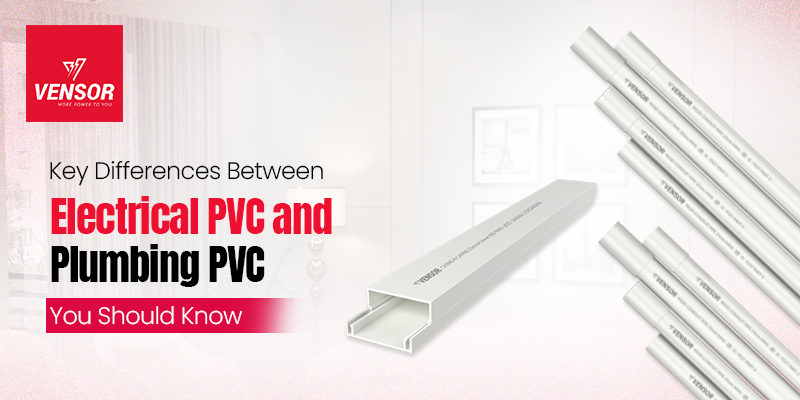When it comes to construction and home improvement, PVC pipes play a vital role. But not all PVC pipes are the same. Electrical PVC and plumbing PVC may appear similar, but they serve distinct purposes and possess unique characteristics. Electrical PVC pipes are designed to protect electrical wiring and ensure safety while plumbing PVC pipes carry water and other fluids within a building.
Choosing the right type is essential to avoid damage or hazards later on. This blog delves into the main differences between these two types of PVC pipes so you can make informed decisions for your projects. For those interested in quality products, picking a reliable electrical pipe brand in India is also important.
Key Characteristics of Electrical PVC
-
Insulation and Safety
Electrical PVC pipes are made to insulate electric wires and protect them from moisture, heat, and physical damage. They help prevent electrical shocks and short circuits by keeping wires properly secured.
-
Durability Against Heat and Fire
These pipes are usually flame-retardant and can withstand higher temperatures compared to plumbing pipes. This makes them suitable for protecting electrical wires, especially in areas where heat is a concern. Choosing a good electric wire manufacturer in India ensures that you get pipes with proper fire resistance.
-
Flexibility and Size Options
Electrical PVC pipes are available in various sizes and thicknesses, typically featuring a smooth surface for easy wire pulling. Their flexibility helps in fitting wires neatly through bends and corners without damaging the insulation on the wires.
Key Characteristics of Plumbing PVC Pipes
-
Water Resistance and Pressure Handling
Plumbing PVC pipes are specially designed to carry water and other liquids. They must be able to resist corrosion and avoid leaking even under high water pressure.
-
Chemical Resistance
These pipes often encounter various chemicals in wastewater and must resist damage from them. Using pipes from a trusted electrical pipe brand in India ensures good quality and resistance.
-
Strength and Rigidity
Plumbing PVC pipes tend to be thicker and stronger than electrical ones. This strength is needed to avoid bursting or cracking when water flows through them at high pressure.
Differences Between Electrical PVC and Plumbing PVC
- Purpose and Application: Electrical PVC pipes are used to protect wires and cables, while plumbing PVC pipes are used to transport water and fluids in buildings.
- Size and Thickness: Plumbing pipes are usually thicker and more rigid than electrical pipes. This is because they must hold water pressure without damage. Electrical pipes, on the other hand, are designed for easy cable installation and have thinner walls.
- Material and Composition: The chemical composition of electrical PVC enables it to resist heat and fire, while plumbing PVC is designed to withstand water pressure and corrosion. A reliable electric wire manufacturer in India focuses on these material differences to ensure safety and performance.
- Standards and Regulations: Different standards govern electrical and plumbing pipes. Electrical PVC must comply with the rules for fire resistance and insulation, while plumbing pipes must meet guidelines for water safety and pressure handling.
- Cost and Availability: Plumbing PVC pipes are often priced differently than electrical PVC due to their materials and manufacturing processes. Also, they may be available in different ranges depending on their usage.
Wrapping Up
Electrical PVC and plumbing PVC serve very different roles and come with distinct characteristics. Understanding these differences helps you select the right pipe for your specific needs. It is essential to choose products from a trusted electrical pipe brand in India for all electrical projects, ensuring safety and durability. As your trusted electrical partner, Vensor Electricals offers high-quality electrical accessories, ensuring your system runs smoothly. You can purchase electrical accessories that can provide the utmost safety. So what are you waiting for? Visit our website to learn more about our products.

